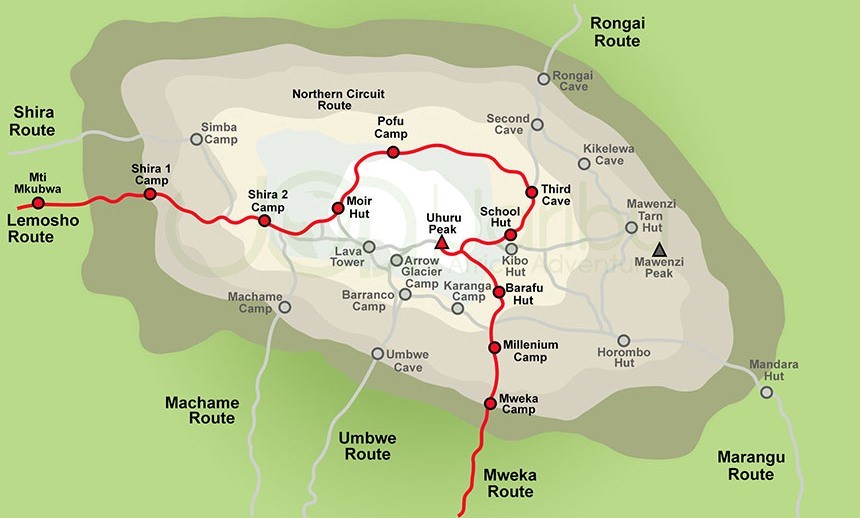

- Tour Name: 8-Day Northern Circuit Kilimanjaro trek
- Duration: 8 Days / 7 Nights on the mountain
- Total Distance: 92 km
- Difficulty Level: Moderate to challenging (long but gradual ascent)
- Success Rate: 95%+ (with proper acclimatization)
- Scenery: Stunning landscapes, diverse ecosystems, and breathtaking views
- Best Time to Climb: June – October & December – March
Therefore, booking an 8-day Northern Circuit route for Kilimanjaro climbing offers several advantages.
The 8-day schedule allows for better acclimatization than shorter routes. With additional days on the mountain, your body has more time to adjust to the high altitudes, increasing your chances of reaching the summit successfully.
The route offers some of the best panoramic views on Kilimanjaro, including vistas of the Shira Plateau, the northern glaciers, and the Rongai side of the mountain.
The Northern Circuit is one of the less-travelled routes, meaning you'll encounter fewer climbers. This creates a more peaceful and serene experience, allowing you to enjoy the mountain's natural beauty without large crowds.
Due to the gradual ascent and more extended acclimatization period, climbers on the Northern Circuit route have a higher success rate of summiting Kilimanjaro compared to those on shorter, more rapid routes.
An introduction to the 8-day Northern Circuit Route, where adventure, stunning landscapes, and a high summit success rate await.
Arrive in Tanzania.
Upon arrival at Kilimanjaro International Airport, you will be greeted and transferred to your hotel in Moshi. You will meet with your guide there, who will provide a detailed briefing on your upcoming eight-day northern circuit route trek. An equipment check will also ensure you have all the necessary climbing gear. Any missing gear can be rented on this day.
Day 1: Lemosho Gate to Mti Mkubwa Camp
-Elevation: 2100 m to 2820 m
-Approx. hiking time: 3-4 hours
-Distance covered: 11 km
-Habitat: Rainforest
The Northern Circuit Route begins at Lemosho Gate (2100 m) in the west, the same starting point as the Lemosho Route. The drive to Londorossi Gate takes approximately two hours from Moshi. Registration with the Kilimanjaro National Park authorities occurs at the gate, after which you will be driven further up the mountain to the trailhead starting point. You may get lucky and spot large wildlife such as elephants, giraffes, and buffalos that sometimes emerge from the rainforest onto the path as you trek toward your first camp. Dinner and overnight at Mti Mkubwa Camp (2820m).
Day 2: Mti Mkubwa Camp to Shira Camp I
-Elevation: 2820 m to 3610 m
-Hiking time: 5 hours
-Distance covered: 8 km
-Habitat: Rainforest / Moorland
Today, you will spend the first hour trekking along the final stretch of the rainforest path before transitioning into the low alpine moorland zone, which leads up to the Shira Plateau. The trek is relatively short and gradual, concluding at Shira Camp I (3610 m).
Day 3: Shira Camp I to Moir Camp
-Elevation: 3610 m to 4200 m
-Hiking time: 3-4 hours
-Distance covered: 7 km
-Habitat: low alpine zone
On day three, the trek takes us from Shira Camp I to Shira Camp II as we cross the Shira Plateau. We will continue eastward to reach the Shira Plateau ridge, proceed to Lava Tower (4,600 m), and descend to Moir Camp (4,200 m).
Day 4: Moir Camp to Pofu Camp
-Elevation: 4200 m to 4020 m
-Hiking time: 5-7 hours
-Distance covered: 12 km
-Habitat: high alpine zone
Today, there is a moderately steep climb out of Moir Valley. Trekkers can take a slight detour to ascend the summit of Little Lent Hill, which stands at 4,375 meters, before returning to the Grand Traverse trail. From this point, the route follows a series of inclines and declines, skirting around the northern slopes of Kibo to Pofu (Buffalo) Camp at 4,020 meters. The trek offers stunning vistas across the plains that stretch north of Kilimanjaro, extending to the Kenyan/Tanzanian border. You will arrive at Pofu Camp just after midday, where you will enjoy lunch, dinner, and an overnight stay.
Day 5: Pofu Camp to Rongai Third Cave
-Elevation: 4020m to 3800 m
-Hiking time: 5-7 hours
-Distance covered: 8 km
Habitat: alpine zone
Day five begins with a climb up Buffalo Ridge and continues east along the northern slopes to Rongai Third Cave at 3,800 meters. The trek is shorter than the previous day, and you should be feeling well-acclimatized to the altitude by now. You will arrive at the Third Cave around mid-afternoon.
Day 6: Third Cave to School Hut
-Elevation: 3800 m to 4800 m
-Hiking time: 4-5 hours
-Distance covered: 7 km
-Habitat: high alpine zone
On day six of the northern circuit, you will experience a steady incline up and over the Saddle, which is located between the peaks of Kibo and Mawenzi. Trekkers will then continue walking southwest to reach School Hut at 4800 m. Upon arrival at School Hut, you will be served an early dinner, and it is advisable to get some sleep since you will be awakened before midnight to begin your summit attempt.
Day 7: School Hut to Uhuru Peak and then down to Millennium Camp
-Elevation: 4800 m to 5895 m and then down to 3950 m
-Hiking time: 12 hours
-Distance covered: 18 km
-Habitat: glacial zone and all preceding zones
You will be awakened at midnight with hot tea and biscuits and then begin the steep incline up the slopes of Kibo under the cover of darkness. Your first checkpoint is Hans Meyer Cave, where you will take a short break. The climb steepens as you approach Gilman’s Point (5681 m), approximately 5-6 hours after departing from School Hut. Take a moment to enjoy the approaching dawn and the incredible view of Mawenzi Peak.
From here, gather all your energy and determination to reach Uhuru Peak (5895 m). The duration of your stay at the summit will depend on the time, weather, and your physical condition. Afterwards, you will head around the crater rim to Stella Point (5739 m), turning south and descending the heavily scree-covered slopes of Kibo to Barafu Camp (4680 m). Most trekkers take a short break here before continuing to Millennium Camp (3950 m) for their final night on the mountain.
Day 8: Millennium Camp to Mweka Gate
-Elevation: 3,950 m to 1,640 m
-Hiking time: 5 hours
-Distance covered: 14 km
-Habitat: glacial zone and all preceding zones
The final day consists of a short hike through the dense montane rainforest from Millennium Camp (3950 m) to Mweka Gate (1640 m). At the gate, you must sign out with the authorities, who will also provide you with your official certificate: a green certificate for those who made it to Gilman’s Point and a gold certificate for those who reached Uhuru Peak. Therefore, this will mark the end of your 8-day Mount Kilimanjaro trekking via the northern circuit route
Depart Tanzania
Later in the evening or the following day, you will be transferred to Kilimanjaro International Airport to board your flight. Additionally, we can arrange an affordable safari trip to one of Tanzania's premier wildlife parks, such as Tarangire National Park, Ngorongoro Crater, or Serengeti National Park.








Two nights’ accommodation in Moshi Town (Before & after the trek – B&B)
Airport pick up and drop off.
Qualified guides with mountain crew
Kilimanjaro National Park fees
All camping equipment: mountain tents, sleeping mats
Transport
Rescue fees
All meals on the mountain (breakfast, lunch, and dinner)
Guides and porters’ accommodations and their entry fees on the mountain
Pulse oximeter
First aid kit
Emergence oxygen
Katady filtered water through the trek
Fair wages to guides and porters as approved by Kilimanjaro National Park Authority
Flights – Domestic and international flights
Visa
Insurance
Tips to mountain crew
Personal Items
Sleeping bags.
Laundry services (available at the hotel for an extra cost)